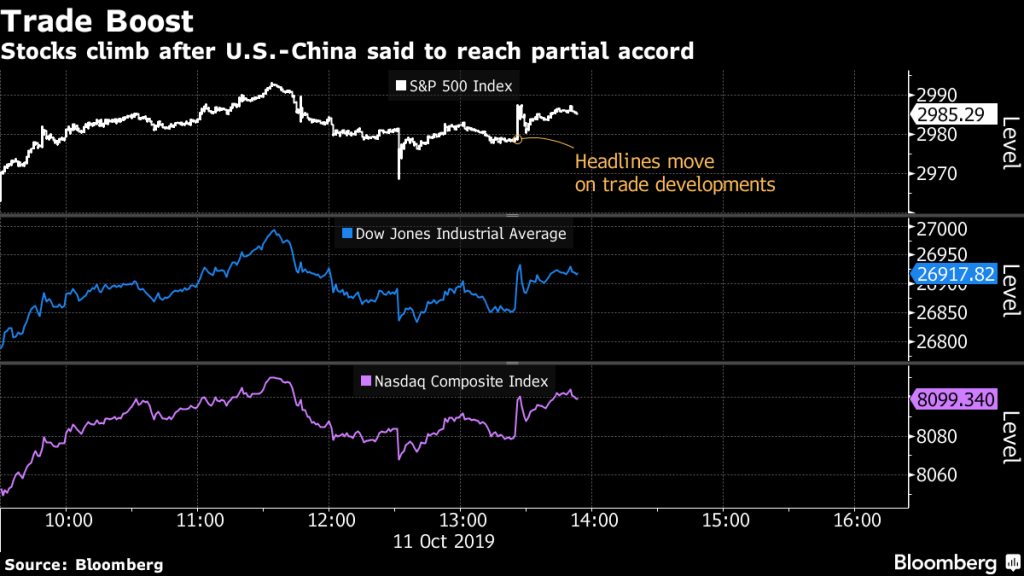US, China reach substantial ‘phase one’ trade deal, Trump says
The US and China agreed on the outlines of a partial trade accord Friday that President Donald Trump said he and China’s Xi Jinping could sign as soon as next month.
As part of the deal, China would significantly step up purchases of US agricultural commodities, agree to certain intellectual-property measures and concessions related to financial services and currency, Trump said Friday at the White House. In exchange, the U.S. will delay a tariff increase due next week as the deal is finalized, though new levies scheduled for December haven’t yet been called off.
As part of the deal, China would significantly step up purchases of US agricultural commodities
The agreement marks the largest breakthrough in the 18-month trade war that has hurt the economies of both nations. Importantly, Trump said the deal was the first phase of a broader agreement. The president indicated he could sign a deal with Xi at an upcoming November summit in Chile.
While the limited agreement may resolve some short-term issues, several of the thorniest disputes remain outstanding. U.S. goals in the trade war center around accusations of intellectual-property theft, forced technology transfer and complaints about Chinese industrial subsidies. The Trump administration also said issues related to Huawei Technologies Co. aren’t part of Friday’s deal and will be a separate process.
Equities advanced globally Friday amid growing conviction that the U.S. and China would negotiate a trade truce. Trump tweeted earlier Friday that “good things” were happening in the two days of meetings — and that if the countries did reach an agreement, he would be able to sign it without a lengthy congressional approval process.

On Thursday and earlier Friday, Liu and U.S. Trade Representative Robert Lighthizer held the first senior-level discussions between Washington and Beijing since a previous agreement fell apart in May and tariffs were raised in the months after.
The U.S. was threatening to increase tariffs next Tuesday on about $250 billion of Chinese imports to 30% from 25%. More duties on $160 billion of Chinese products were targeted for Dec. 15.
The threat of those import taxes on U.S. consumers, falling around the holiday season, raised the prospect that the U.S. economy would slide toward a recession heading into Trump’s 2020 reelection bid. The American manufacturing industry, which Trump vowed in 2016 to revitalize, is already contracting in part because of the trade war.
U.S.-China Trade War Timeline: What’s Happened Since May 2019
China in recent weeks had already discussed buying more U.S. products such as soybeans, pork and wheat. Some traders remained skeptical that buying soybeans from the U.S. represented a significant breakthrough in the overall trade talks, Bloomberg reported Friday.
Earlier Friday, Trump indicated in a Twitter post that if the countries did reach an agreement, he would be able to sign it quickly.
One of the great things about the China Deal is the fact that, for various reasons, we do not have to go through the very long and politically complex Congressional Approval Process. When the deal is fully negotiated, I sign it myself on behalf of our Country. Fast and Clean!— Donald J. Trump (@realDonaldTrump) October 11, 2019
Senator Ronald Wyden, the ranking Democrat on the Finance Committee that has jurisdiction over trade policy, pushed back on Trump’s tweet in a statement Friday to Bloomberg News: “Donald Trump should know that any meaningful trade deal is only legitimate because of the authority granted to him by Congress, and that authority can be taken away,” he said.
Under the U.S. Constitution, Congress holds power over international trade. For decades, it has legally delegated trade-negotiating authority to the executive branch. Lawmakers in recent months have grown increasingly wary of what they see as Trump’s abuse of that authority and discussed ways to claw it back, citing the president’s many unilateral tariff measures and a lack of transparency in negotiations.
(By Jenny Leonard, Saleha Mohsin, Josh Wingrove and Shawn Donnan, with assistance from Jennifer Jacobs, Ye Xie and Isis Almeida)
More News
Contract worker dies at Rio Tinto mine in Guinea
Last August, a contract worker died in an incident at the same mine.
February 15, 2026 | 09:20 am
{{ commodity.name }}
{{ post.title }}
{{ post.date }}




Comments